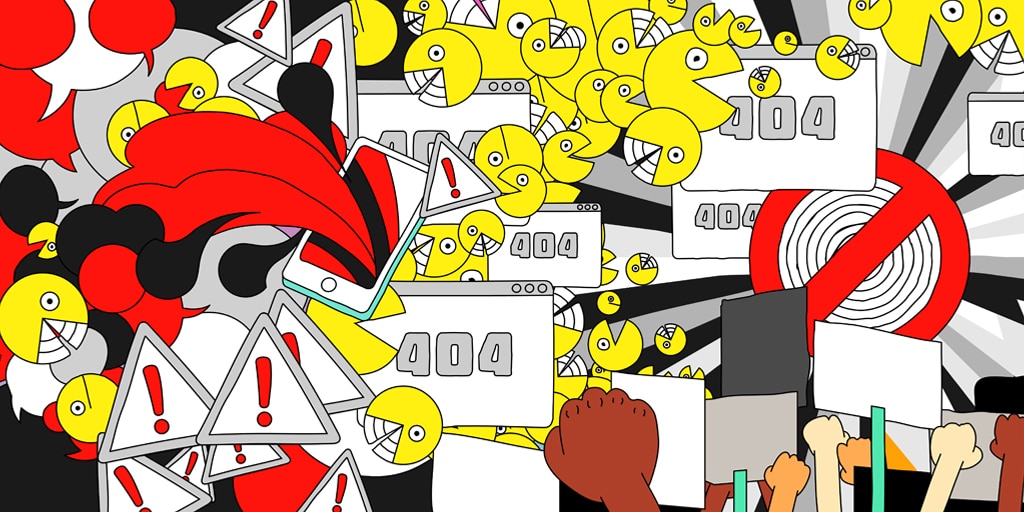For over a century, sanctions regimes have been a preferred foreign policy tool for states seeking to punish those who jeopardize peace, wage war, or infringe human rights. But in the digital age, implementing sanctions can inadvertently curtail millions of ordinary people’s fundamental rights. Despite this, countries continue to careen recklessly down Sanctions Boulevard, brandishing outdated protocols better suited to the Cold War of the previous century. To prevent further harm to fundamental rights and to ensure modern sanctions regimes are fit-for-purpose, authorities, companies, and civil society must all step up.
The state of sanctions in 2023
Whether states implement sanctions against each other or against individuals or entities, they do so to persuade, coerce, or compel alleged wrongdoers to stop what they are doing. Measures range from comprehensive trade embargoes, to targeted asset freezes or travel restrictions, with penalties extending to billion-dollar fines and lengthy prison terms. Since 9/11, the latter have been preferred as being more effective and less likely to cause collateral damage; as the UN High Commissioner on Human Rights has pointed out, “targeted sanctions have a less harmful impact on the population.”
At the time of writing, the U.S. has over 10,000 people and entities on its sanctions lists, while there are over 30 E.U. and UN sanctions regimes in place globally. In the past year alone, new sanctions have been imposed on countries such as Russia, Belarus, Iran, Mali, and North Korea. Among these, economic and tech sanctions, which target the tech sector or the export, sale, transfer, servicing, and use of new and emerging technologies, such as spyware, are particularly relevant from a digital rights perspective.
How sanctions regimes jeopardize human rights
While sanctions are often implemented with the intent to advance human rights and democratic values, they can be counterproductive, adversely and disproportionately impacting the rights and interests of vulnerable communities. This is particularly true for broad economic sanctions, which, for example, may deprive entire populations of open and secure internet access – an essential enabler of social, political, and economic rights – and which limit the ability to provide increasingly digitized humanitarian support where needed. Their impact even reaches under the sea; the U.S. isolation policy against Cuba has prevented submarine fiber optic internet cables from landing on the island for decades.
Targeted sanctions imposed without due consideration can also harm human rights. Following Russia’s invasion of Ukraine, for instance, civil society warned against sanctions inadvertently isolating all Russian people – including civil rights activists, journalists, and dissidents – from free flows of information, leaving them even more vulnerable to state propaganda and surveillance. Several countries, including the U.S. and U.K., responded by instituting exceptions, or carve-outs, aimed at allowing people in Russia to retain access to the global internet. The U.S. government created similar carve-outs in its sanctions regime against Iran, to support protesters and activists using online tools and platforms to exercise their human rights.
Such carve-outs are a step forward towards more nuanced, fit-for-purpose, and effective sanctions regimes, by reassuring tech companies, as well as financial institutions and other transaction processors, that they can continue to offer their products and services without breaking the law. But it shouldn’t have taken outcry from civil society to institute such safeguards; states should embed protections for internet access, alongside long-standing humanitarian exceptions, into any and all sanctions regimes. Meanwhile, companies must also be wary of over-complying with the rules or succumbing to external pressure to go beyond what is legally required. Doing so may inadvertently disconnect people from their usual digital lifelines, forcing them to rely on less secure, pirated, or unlicensed software, or government-approved platforms more likely to expose them to surveillance and censorship.
The case of Russia shows that the sum of targeted sanctions, mass corporate pullouts, and over-compliance can quickly result in a de facto embargo. In March 2022, newsletter service provider Mailchimp withdrew from Russia in a show of support for the people of Ukraine. However, they went too far when they shut down the accounts of prominent human rights organizations – thus helping the Russian regime to silence civil society.
The sudden withdrawal of many tech companies from the Russian market, leaving human rights defenders isolated from the outside world, has been condemned by UN human rights experts. We know from other countries that the impact of such regimes can be felt for years, with companies reluctant to (re)enter newly-legal markets. U.S. sanctions against Sudan were largely withdrawn in 2017, yet access to the Google Play Store and Apple App Store remain difficult, with paid applications and services largely inaccessible.
Making sanctions regimes fit-for-purpose
Currently, the decision-making processes behind sanctions regimes are opaque, with few mechanisms for monitoring, accountability, and redress, or for business and civil society to advise on the necessity and proportionality of proposed sanctions. For sanctions to be effective in spotlighting human rights violations and deterring further abuses, these processes must be open to scrutiny and feedback. By systematizing cooperation and consultation between government, business, and civil society around the design and development of sanctions regimes, we can prevent banks and tech companies from haphazardly copy-pasting long lists of sanctions targets into their “de-risking” initiatives – a “tick-box” exercise in compliance.
A shared commitment and space for all actors to make sanctions regimes fit-for-purpose, and to limit collateral damage, demands that states abandon overly broad measures that punish entire populations, prevent communities from accessing information, restrict civic space, or encourage companies to over-comply. As we approach the one-year mark since Russia’s invasion of Ukraine and the subsequent escalation of international sanctions against Putin’s regime, governments, businesses, and civil society must align in support of our shared ambitions of advancing human rights and democratic values through sanctions regimes. Otherwise they risk doing more harm than good.
